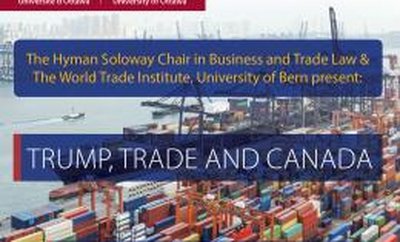29 May 2017
NCCR Global Series 11: Trump, Trade and Canada
The latest in the NCCR Global Series of events – a one-day academic workshop on 'Trade and Investment Law Challenges in the Trump Era: What is the role of Canada?' – was held at the University of Ottawa, Canada on 16 May.
The event was sponsored by the Hyman Soloway Chair in Business and Trade Law, University of Ottawa and the World Trade Institute, University of Bern.
Professor Manfred Elsig and PhD candidate Simon Wüthrich of the WTI participated in the workshop. Prof. Manfred Elsig presented a paper on European Union trade policy with the title ‘Performance in Trade Negotiations: The case of European Union Trade Agreements’ (co-authored with Todd Allee, Andrew Lugg and Simon Wüthrich). Simon Wüthrich gave a presentation on ‘CETA in the news: media-framing of the EU-Canadian Treaty’.
Wolfgang Alschner, previously of the WTI and now assistant professor at the University of Ottawa, spoke on the potential renegotiation of the North American Free Trade Agreement (NAFTA).
According to participant Simon Wüthrich, “the workshop was in fact both academic and policy-making, offering an ideal mix between scholarly research on politically salient trade agreements (NAFTA and CETA) and policy-making reflections thereon”.
“Recurrent topics in the different sessions included to what extent failures of official communication strategies and policy content contributed to anti-globalisation sentiments in the United States, and alternative ways for Canada to adapt to the new challenges in global trade regulation, e.g. by assuming a more active role at different levels of negotiation or by being more selective and ‘smart’ with its trade policy projects.”
"Dynamic" public discussion
The workshop was preceded on 15 May by a public panel discussion on 'Trump, Trade and Canada'. Hyman Soloway Chair Debra Steger tweeted: "Terrific panel last night on Trump Trade and Canada" and thanked all the speakers.
The panel discussion focused on challenges for international trade regulation under the Trump presidency. The speakers highlighted protectionist tendencies in the US administration’s trade policy and identified the challenges arising from it for Canada, the World Trade Organization and the world at large. Around 70 participants attended the event from a diverse set of backgrounds. Amongst them were representatives from the embassy of Switzerland, Germany, Qatar, and the ambassador of Japan as well as students, trade practitioners, government officials and academics.
Simon Wüthrich said the “very dynamic” panel included reflections on the scope and pace of the potential NAFTA renegotiations (John Weekes), Trump’s new strategies in relying on flexibility instruments benefitting US steel and aluminium (Jennifer Hillman), the motivations behind Sino-US Cooperation in international trade (Yuen Pau Woo), as well as the question of (lacking) political leadership for the TTIP negotiations on the side of the European Union (Manfred Elsig).
All speakers and commentators at the two-day event agreed that the trade policy of the Trump Administration marked an important shift in long-standing US policy whose repercussions are difficult to assess but potentially severe. As one speaker put it in relation to Canada: “We have to hope for the best, but plan for the worst”. Amidst this renewed importance of trade regulation, rising protectionism and a growing backlash against trade and its institutions, the event was welcomed as a timely opportunity to take stock, to look back at past research including projects emerging from NCCR Trade Regulation and to scope the research questions of the future.
The Global Series on Trade Regulation is organised by the WTI-hosted NCCR Trade Regulation, which comes to an end this year. It highlights insights gained by researchers over the 12 years of the research project.
Further info
Panel and workshop programme


